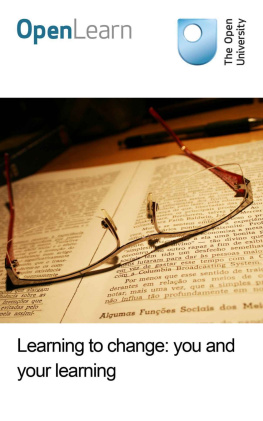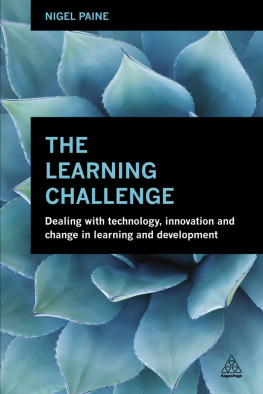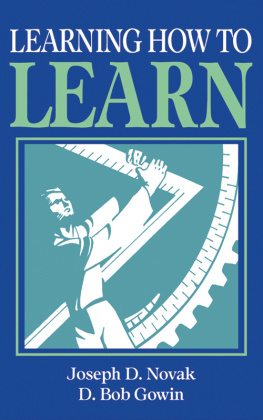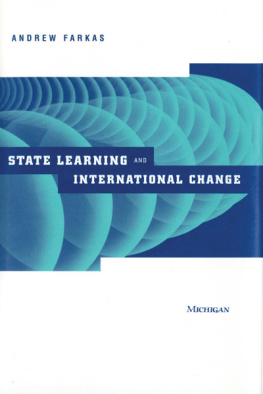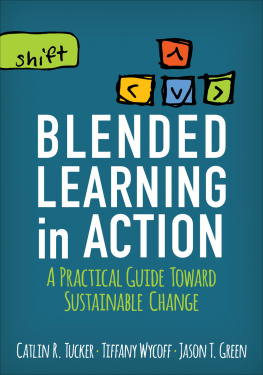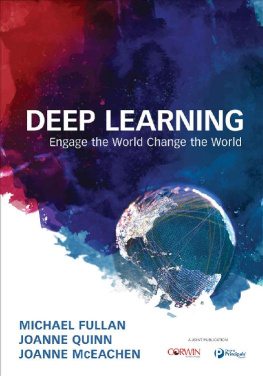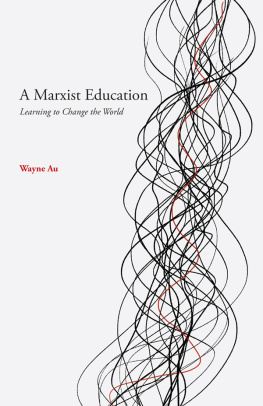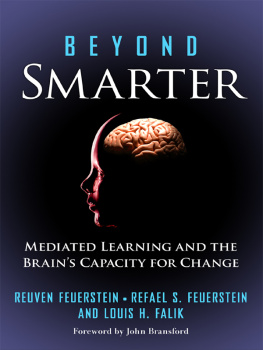Learning to change
Here you can read online Learning to change full text of the book (entire story) in english for free. Download pdf and epub, get meaning, cover and reviews about this ebook. year: 2016, publisher: The Open University, genre: Children. Description of the work, (preface) as well as reviews are available. Best literature library LitArk.com created for fans of good reading and offers a wide selection of genres:
Romance novel
Science fiction
Adventure
Detective
Science
History
Home and family
Prose
Art
Politics
Computer
Non-fiction
Religion
Business
Children
Humor
Choose a favorite category and find really read worthwhile books. Enjoy immersion in the world of imagination, feel the emotions of the characters or learn something new for yourself, make an fascinating discovery.
Learning to change: summary, description and annotation
We offer to read an annotation, description, summary or preface (depends on what the author of the book "Learning to change" wrote himself). If you haven't found the necessary information about the book — write in the comments, we will try to find it.
Unknown: author's other books
Who wrote Learning to change? Find out the surname, the name of the author of the book and a list of all author's works by series.
Learning to change — read online for free the complete book (whole text) full work
Below is the text of the book, divided by pages. System saving the place of the last page read, allows you to conveniently read the book "Learning to change" online for free, without having to search again every time where you left off. Put a bookmark, and you can go to the page where you finished reading at any time.
Font size:
Interval:
Bookmark:
About this free course
This free course provides a sample of level 1 study in Education, Childhood & Youth http://www.open.ac.uk/courses/find/education-childhood-and-youth
This version of the content may include video, images and interactive content that may not be optimised for your device.
You can experience this free course as it was originally designed on OpenLearn, the home of free learning from The Open University: http://www.open.edu/openlearn/education/learning-change/content-section-0.
There youll also be able to track your progress via your activity record, which you can use to demonstrate your learning.
The Open UniversityWalton HallMilton Keynes MK7 6AA
Copyright 2016 The Open University
Intellectual property
Unless otherwise stated, this resource is released under the terms of the Creative Commons Licence v4.0 http://creativecommons.org/licenses/by-nc-sa/4.0/deed.en_GB. Within that The Open University interprets this licence in the following way: www.open.edu/openlearn/about-openlearn/frequently-asked-questions-on-openlearn. Copyright and rights falling outside the terms of the Creative Commons Licence are retained or controlled by The Open University. Please read the full text before using any of the content.
We believe the primary barrier to accessing high-quality educational experiences is cost, which is why we aim to publish as much free content as possible under an open licence. If it proves difficult to release content under our preferred Creative Commons licence (e.g. because we cant afford or gain the clearances or find suitable alternatives), we will still release the materials for free under a personal end-user licence.
This is because the learning experience will always be the same high quality offering and that should always be seen as positive even if at times the licensing is different to Creative Commons.
When using the content you must attribute us (The Open University) (the OU) and any identified author in accordance with the terms of the Creative Commons Licence.
The Acknowledgements section is used to list, amongst other things, third party (Proprietary), licensed content which is not subject to Creative Commons licensing. Proprietary content must be used (retained) intact and in context to the content at all times.
The Acknowledgements section is also used to bring to your attention any other Special Restrictions which may apply to the content. For example there may be times when the Creative Commons Non-Commercial Sharealike licence does not apply to any of the content even if owned by us (The Open University). In these instances, unless stated otherwise, the content may be used for personal and non-commercial use.
We have also identified as Proprietary other material included in the content which is not subject to Creative Commons Licence. These are OU logos, trading names and may extend to certain photographic and video images and sound recordings and any other material as may be brought to your attention.
Unauthorised use of any of the content may constitute a breach of the terms and conditions and/or intellectual property laws.
We reserve the right to alter, amend or bring to an end any terms and conditions provided here without notice.
All rights falling outside the terms of the Creative Commons licence are retained or controlled by The Open University.
Head of Intellectual Property, The Open University
Edited and designed by The Open University.
Printed and bound in the United Kingdom by Scot Print Ltd.
978-1-4730-1765-8 (.kdl)
978-1-4730-0997-4 (.epub)
Being unsure of what you want to do in life (or what you want to study) is not unusual. How to deal with the changes that we want in our lives can be more challenging. You may be unsure about what subject you are interested in or whether you can cope with study at university level. You may be unsure about what path in life to pursue.
This course takes your life as its starting point. It helps you to think about what you can do already. It then uses this to build up your confidence in your abilities. It uses a mixture of personal reflection, case studies (including three real-life case studies) and ideas about how we learn. This combination equips you to move your life forward.
This OpenLearn course provides a sample of level 1 study in Education, Childhood & Youth
After studying this course, you should be able to:
- understand the importance of the word skills
- think personally about learning
- understand that valuable and important learning goes on all the time
- appreciate that learning can involve thinking, doing and feeling
- understand more clearly what has been learned and what qualities, knowledge and skills are already there.
Learning to change is a course for people who are interested in learning about making changes in their lives. We think that you will find the course interesting and that it will give you ideas that are useful for bringing about personal change.
The aims of this section are to:
- provide you with a clear idea of what the course is about and how it is structured
- help you understand the importance of the word skills
- start you thinking about your own learning.
This course is based on the assumption that learning and change are features of all our lives, including those of these three people:
I left school w hen I was fifteen and I started work the day after. My qualifications were basically nil. I had no GCSEs. No A levels. I went to secondary modern school and I immediately got myself a job in an office as an office assistant when I left school. Three pounds ten shillings a week was my wage then. My first job was a filing clerk and I actually realised that I didnt know my alphabet properly, so I actually found a file and I stuck it on the wall. My manager asked me what I was doing at that time and I admitted I was getting a little bit confused. And he said, Well carry on. Thats a good idea. Oh I would rather have the files in the correct order rather than have them wrong!

Figure 1 Karen
I left school at the age of sixteen with three basic qualifications CSE qualifications, as they were known.

Figure 2 Levene
I left school about sixteen years ago and I left with GCSEs and I was studying A levels which I werent up to because I got married. I was supposed to carry on with my studying but I didnt because my mother-in-law was ill and so I ended up looking after her. And then we moved away and we moved to America for two years. We lived there and so that is why I had to have a break in my studies. And in between that I had my children. And because I was so young I didnt want to leave them and go back to university. So while they were younger I used to child mind at home with them.

Font size:
Interval:
Bookmark:
Similar books «Learning to change»
Look at similar books to Learning to change. We have selected literature similar in name and meaning in the hope of providing readers with more options to find new, interesting, not yet read works.
Discussion, reviews of the book Learning to change and just readers' own opinions. Leave your comments, write what you think about the work, its meaning or the main characters. Specify what exactly you liked and what you didn't like, and why you think so.

